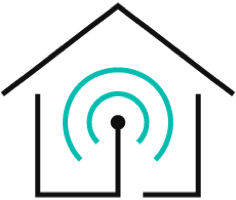When it comes to home automation, Zigbee and Wi-Fi are two popular wireless technologies used for smart home devices. Bluetooth is another technology that is commonly used for smart home devices, but it is not as widely used as Zigbee and Wi-Fi. In this article, we'll compare Zigbee and Wi-Fi to help you decide which is best for your home automation needs.
- Zigbee vs. Wi-Fi
- Zigbee vs. Bluetooth
- Zigbee vs. Bluetooth Range
- Difference Between Zigbee and Bluetooth and Wi-Fi
- Difference Between Zigbee and Wi-Fi
- Wi-Fi vs. Zigbee for Home Automation
- Zigbee vs. Wi-Fi Power Consumption
- Which is Best for Home Automation - Zigbee or Wi-Fi?
Zigbee vs. Wi-Fi
Zigbee is a wireless technology that is designed for low-power, low-bandwidth, and low-cost communication between devices. Zigbee operates on the 2.4 GHz frequency band and is designed to work in environments with a lot of interference, such as a home with multiple Wi-Fi networks and other wireless devices.
Wi-Fi, on the other hand, is a wireless technology that is designed for high-speed, high-bandwidth, and high-power communication between devices. Wi-Fi operates on the 2.4 GHz and 5 GHz frequency bands and is best suited for streaming media and other high-bandwidth applications.
The main difference between Zigbee and Wi-Fi is the way they handle communication between devices. Zigbee uses a mesh networking system that allows devices to communicate with each other and pass messages along, while Wi-Fi uses a point-to-point networking system that requires a central access point to manage communication between devices.

>> Zigbee vs Z-Wave: What's the difference?
Zigbee vs. Bluetooth
Bluetooth is another wireless technology that is commonly used for smart home devices. Bluetooth operates on the 2.4 GHz frequency band and is designed for short-range communication between devices.
The main difference between Zigbee and Bluetooth is the range and the number of devices that can be connected. Zigbee has a longer range than Bluetooth and can connect more devices at once, making it a better choice for larger homes with many smart devices.

Zigbee vs. Bluetooth Range
When it comes to range, Zigbee has a longer range than Bluetooth. Zigbee can transmit signals up to 100 meters, while Bluetooth has a range of only 10 meters. This means that Zigbee is better suited for larger homes or homes with many walls and obstacles that can interfere with the signal.
Difference Between Zigbee and Bluetooth and Wi-Fi
The main difference between Zigbee, Bluetooth, and Wi-Fi is the way they handle communication between devices. Zigbee uses a mesh networking system that allows devices to communicate with each other and pass messages along. Bluetooth uses a point-to-point networking system that requires a central access point to manage communication between devices. Wi-Fi uses a similar point-to-point networking system but is designed for high-bandwidth applications like streaming media.

Difference Between Zigbee and Wi-Fi
The main difference between Zigbee and Wi-Fi is the way they handle communication between devices. Zigbee uses a mesh networking system that allows devices to communicate with each other and pass messages along. Wi-Fi uses a point-to-point networking system that requires a central access point to manage communication between devices. Zigbee is designed for low-power, low-bandwidth communication between devices, while Wi-Fi is designed for high-speed, high-bandwidth communication.
Wi-Fi vs. Zigbee for Home Automation
When it comes to home automation, both Wi-Fi and Zigbee have their strengths and weaknesses. Wi-Fi is best suited for high-bandwidth applications like streaming media, while Zigbee is best suited for low-power, low-bandwidth applications like smart home sensors and switches.

Zigbee vs. Wi-Fi Power Consumption
When it comes to power consumption, Zigbee is designed to be low-power and energy-efficient. Zigbee devices can run on batteries for months or even years, making it an excellent choice for smart home devices that don't need to be plugged in.
Wi-Fi, on the other hand, is designed for high-bandwidth applications and requires more power to transmit data. Wi-Fi devices are typically powered by a constant source of electricity and can consume more energy than Zigbee devices.
Which is Best for Home Automation - Zigbee or Wi-Fi?
When it comes to home automation, the best wireless technology depends on the specific use case. Zigbee is best suited for low-power, low-bandwidth devices like smart home sensors, switches, and bulbs, while Wi-Fi is best suited for high-bandwidth applications like streaming media and video surveillance.
One advantage of Zigbee is its ability to create a mesh network, allowing for a larger coverage area and the ability to add more devices without impacting the network's performance. This makes Zigbee an excellent choice for large homes or buildings where many devices need to be connected.
Wi-Fi, on the other hand, is well-suited for applications that require high-speed data transfer, like streaming 4K videos or large file transfers. It is also the most widely used wireless technology, so many devices support Wi-Fi connections.
Zigbee vs. Wi-Fi: Conclusion
Both Zigbee and Wi-Fi have their strengths and weaknesses when it comes to home automation. Zigbee is best suited for low-power, low-bandwidth devices, while Wi-Fi is best suited for high-bandwidth applications.
Ultimately, the choice between Zigbee and Wi-Fi will depend on the specific use case and the devices you plan to connect. It's also worth considering other factors like cost, ease of use, and the number of devices you plan to connect.
If you're still unsure which wireless technology is best for your smart home needs, you might consider a hybrid approach that combines both Zigbee and Wi-Fi. Many smart home hubs like Samsung SmartThings and Amazon Echo Plus support both Zigbee and Wi-Fi connections, allowing you to use the best wireless technology for each device.
In conclusion, both Zigbee and Wi-Fi have their own unique advantages and disadvantages. It's important to weigh the pros and cons and consider your specific use case before deciding which wireless technology to use for your smart home devices.
It has better power consumption than the other so it’s the best pick for IoT devices that use batteries to operate. IoT devices such as Evvr In-Wall Relay Switch which uses Zigbee will give you basically the same level of security as WiFi while keeping the power consumption minimum.
If you’re ready to get yourself some smart home devices but not sure which devices use Zigbee technology you can leave us a message. We’d be more than happy to educate you about these technologies so you can choose the best IoT device for your home.















